Although most credit cards require good credit, getting one is possible even if you have poor credit. That’s good news for anyone who’s either looking to build credit or needs a credit card for emergencies. With that in mind, here are the best secured and unsecured credit cards for bad credit.
Table of Contents
12 Top Credit Cards for Applicants with Poor Credit
There are two main types of credit cards: secured and unsecured. People with bad credit are usually eligible for a secured card, even if they’re not eligible for a traditional (unsecured) one. Whichever type you go for, review the offer carefully to make sure it suits your needs.
6 Best Secured Credit Cards
Secured credit cards are one of the easiest types of cards for people with poor credit to get approved for — and can even help build credit. This is because they require a deposit to open the account, and the deposit typically acts as the credit limit. It also serves as protection if you don’t pay the bill.
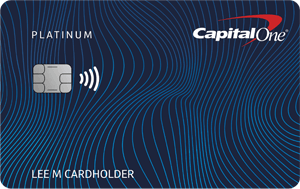
Best Overall Secured Credit Card: Capital One Platinum Secured
- Intro offer: N/A
- APR: 26.99% Variable
- Annual fee: None
- Balance transfer fee: N/A
- Foreign transaction fee: None
- Late payment fee: Up to $40
- Intro APR offer: N/A
- Credit check: Yes
- Recommended credit score: 300 to 669
- Minimum security deposit: $49 for a $200 credit line
- Special perks: $0 fraud liability protection against unauthorized charges. May receive a higher credit limit (up to $1,000) after 6 months.
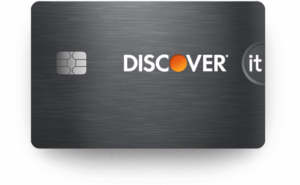
Best Secured Rewards Credit Card: Discover It Secured
- Intro offer: Discover matches all cash back at the end of the first 12 months
- APR: 25.24% Variable
- Annual fee: None
- Balance transfer fee: 3% on balances transferred before December 11, 2022; 5% on transfers after that
- Foreign transaction fee: None
- Cash advance fee: 5% or $10 of the amount, whichever is higher
- Late payment fee: Up to $41
- Intro APR offer: 10.99% APR on balance transfers for the first 6 months
- Credit check: Yes
- Recommended credit score: 300 to 669
- Minimum security deposit: $200 to $2,500
- Special perks: 2% cash back at restaurants and gas stations on up to $1,000 (per quarter). 1% cash back on all other purchases. Free access to your FICO score each month.
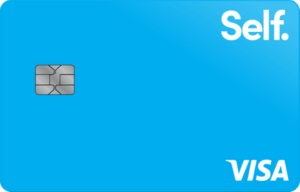
Best to Build Credit: Self Credit-Builder Account with Secured Visa Credit Card
- Intro offer: N/A
- APR: 26.24% Variable
- Annual fee: $25
- Balance transfer fee: N/A
- Foreign transaction fee: None
- Late payment fee: None
- Intro APR offer: N/A
- Credit check: No
- Recommended credit score: 300 to 669
- Minimum security deposit: None (payments made in your Self’s certificate of deposit become the security deposit)
- Special perks: Self reports card and self-builder loan payments to add to your credit mix and help build credit.
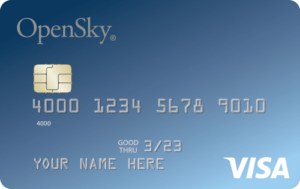
Best for Taking Control: OpenSky Secured Visa Credit Card
- Intro offer: N/A
- APR: 18.99% Variable
- Annual fee: $35
- Balance transfer fee: N/A
- Foreign transaction fee: 3%
- Cash advance fee: 5% or $6 (whichever is greater)
- Late payment fee: $38
- Intro APR offer: N/A
- Credit check: No
- Recommended credit score: 300 to 669
- Minimum security deposit: $200 to $3,000
- Special perks: N/A
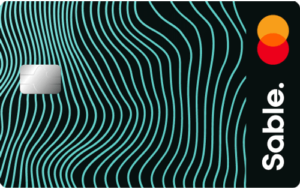
Best First-Year Bonus: Secured Sable One
- Intro offer: N/A
- APR: 12.49% Variable
- Annual fee: None
- Balance transfer fee: N/A
- Foreign transaction fee: None
- Late payment fee: None
- Intro APR offer: N/A
- Credit check: No
- Recommended credit score: 300 to 669
- Minimum security deposit: $10
- Special perks: Earn 2% cash back on some purchases (ex. Amazon, Netflix, Uber Eats). Earn 1% on all other everyday purchases. May be eligible for an unsecured card after 4 months.
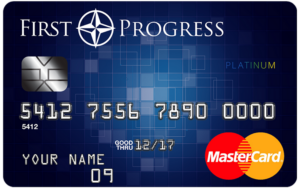
Best for Fast Processing: First Progress Platinum Prestige Mastercard Secured Credit Card
- Intro offer: N/A
- APR: 12.24% Variable
- Annual fee: $49
- Balance transfer fee: N/A
- Foreign transaction fee: 3%
- Late payment fee: Up to $39
- Intro APR offer: N/A
- Credit check: No
- Recommended credit score: Any (discharged bankruptcy may be OK)
- Minimum security deposit: $200 (refundable)
- Credit limit: $200 to $2,000 (based on the security deposit)
- Special perks: Comes with real-time credit monitoring and access to your credit score through Experian.
6 Best Unsecured Credit Cards
Secured credit cards have their advantages, but if you want to experience more of the perks of traditional credit cards, an unsecured card may be better. Here are the best-unsecured credit cards for bad credit.

Best Overall Unsecured Credit Card: Petal 1 “No Annual Fee” Visa
- Intro offer: N/A
- APR: 22.24% to 31.74% Variable
- Annual fee: None
- Balance transfer fee: N/A
- Foreign transaction fee: None
- Late payment fee: $40
- Intro APR offer: N/A
- Credit check: Yes (after pre-approval)
- Recommended credit score: 300 to 669 (may still be eligible without a credit score)
- Credit limit: $300 to $5,000
- Special perks: Earn 2% to 10% cash back on qualifying purchases. There’s a “Spend Planner” feature to help with budgeting.

Best for Low Annual Fee: Mission Lane Visa
- Intro offer: N/A
- APR: 26.99% to 29.99% Variable
- Annual fee: Up to $59
- Balance transfer fee: N/A
- Foreign transaction fee: 3%
- Late payment fee: Up to $35
- Intro APR offer: N/A
- Credit check: Yes (prequalification available)
- Recommended credit score: 580
- Credit limit: $300 to $5,000
- Special perks: N/A

Best for Fraud Protection: Destiny MasterCard
- Intro offer: N/A
- APR: 24.90%
- Annual fee: $75 for the first year; $99 for each year after that
- Balance transfer fee: N/A
- Foreign transaction fee: 1%
- Late payment fee: Up to $40
- Intro APR offer: N/A
- Credit check: Yes (prequalification available)
- Recommended credit score: Any (prior bankruptcy OK)
- Credit limit: $300+
- Special perks: N/A
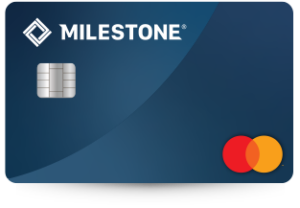
Best for Poor Credit: Milestone MasterCard
- Intro offer: N/A
- APR: 24.9%
- Annual fee: $35 to $99
- Balance transfer fee: N/A
- Foreign transaction fee: 1%
- Late payment fee: Up to $40 (25-day grace period)
- Intro APR offer: N/A
- Credit check: Yes (prequalification available)
- Recommended credit score: Any
- Credit limit: $300
- Special perks: It comes with $0 fraud liability protection.
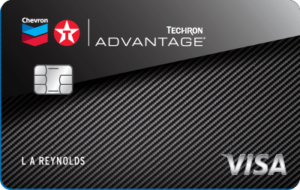
Best for Gas Stations Only: Chevron/Texaco Techron Advantage Card
- Intro offer: N/A
- APR: 26.99%
- Annual fee: None
- Balance transfer fee: N/A
- Foreign transaction fee: 3%
- Cash advance fee: 5% or $10 (whichever is greater)
- Late payment fee: Up to $40
- Intro APR offer: N/A
- Credit check: Yes
- Recommended credit score: 620
- Special perks: Using it at participating gas stations and retailers lets you earn fuel credits. New cardholders can get $0.37 off the gallon for the first 90 days. You can also earn $0.03 per gallon on diesel or regular gas at Chevron and Texaco.
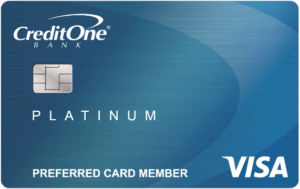
Best for Easy Approval: Credit One Bank® Platinum Visa® for Rebuilding Credit
- Intro offer: Lower initial annual fee
- APR: 25.49% Variable
- Annual fee: $75 first year, then $99 for each year thereafter
- Balance transfer fee: N/A
- Foreign transaction fee: 3%
- Late payment fee: Up to $39
- Intro APR offer: N/A
- Credit check: Yes (prequalification available)
- Recommended credit score: Below 640
- Credit limit: $300 to $500
- Special perks: Earn 1% cash back on groceries, gas, utilities and phone bills. Zero fraud liability protection with free access to your Experian credit score.
How Does a Secured Credit Card Work?
Secured credit cards are meant to help people build or rebuild their credit. They do this by reporting payment activity to all three major credit bureaus — Experian, TransUnion and Equifax.
Unlike traditional credit cards, secured cards typically require an initial cash deposit. This deposit serves as the credit limit or as security in case you default on payments.
Similar to traditional cards, a secured card may be used for everyday purchases, monthly bills and more. As long as you pay off your monthly balance in full on time, you can build credit over time without incurring interest charges.
A secured card may be automatically converted into an unsecured card after 4 to 12 months with good activity. This could mean a higher credit limit and the standard perks or rewards of traditional cards.
Similar to other credit cards, secured cards require an application. They may require a credit check as well.
Factors to Consider When Choosing a New Card
Credit cards for bad credit, especially unsecured cards, often come with high APR and hidden fees. They may also have high eligibility requirements.
When choosing a credit card, consider the following:
- Annual fees
- Starting credit limit (and if it automatically increases over time)
- APR or interest rate
- Fixed or variable APR
- Hidden fees (foreign transaction, late payment, returned payment, balance transfer, cash advance, etc.)
- Cash back rewards and rewards rate
- Promotional or welcome offers
- Mobile app and accessibility
- Customer reviews
- Member FDIC
- Extended warranties or purchase protection
- Cell phone protection
- Zero liability fraud protection
Credit Scores: What You Need to Know
A person’s credit score is important for many reasons. It can determine the financing you qualify for, and at what rates. A higher credit score usually means better rates and terms.
A credit score can also affect other areas of life. Many landlords will run a credit check to determine whether to rent to an applicant. Some insurance companies also check credit to determine premiums for things like auto or home insurance.
Around 90% of U.S. lenders use a person’s FICO score as part of their lending decision. Here are the FICO score ranges:
- Excellent: 740 to 850
- Good: 670 to 739
- Fair: 580 to 669
- Poor: 300 to 579
Several factors affect your credit scores, such as payment history, credit usage, credit mix and the average length of credit history.
Contrary to popular belief, there is no set starting credit score. Most people don’t receive a score until they apply for or open an account.
Before applying for a credit card or loan, check your credit score and review your credit report. This will give you a good idea of whether you qualify without affecting your score.
Does your credit score need a boost? Here are some tips on how to increase it.
Application Process
Applying for a credit card, regardless of credit score, is straightforward. Here are the basic steps:
- Check your credit score and compare it to different cards’ eligibility requirements.
- Pull your credit report and review it. Prepare to dispute any errors bringing down the overall score.
- Research various cards’ offers. Look for one that meets your needs. For example, does it offer a cash back or rewards program? What’s the intro APR? What are the regular interest charges?
- Decide between a secured and an unsecured credit card (based on your credit score). If you get a secured card, check the minimum security deposit. You may need to save up for it.
- Gather any required paperwork. This usually includes recent bank account statements, Social Security number (SSN), proof of income, etc.
- See if there’s a prequalification option. If you don’t prequalify, ask a family member to be a joint applicant.
- Apply, get approved and wait for the card to arrive.
The Bottom Line
Credit cards for bad credit exist, which is good news for anyone who needs to rebuild or establish credit. Before getting a credit card, check the eligibility requirements and compare offers to find the best one.
After applying, be strategic and use the card responsibly. With good credit habits, your score will improve over time.
FAQs
If you have poor credit, it can seem like a struggle to build it up. But don’t worry – here are some ways to improve it:
–Use any existing credit cards responsibly.
–Make all payments on time, even if it’s just the minimum payment.
–Watch your credit utilization. Try to keep it below 30%.
–Ask for a higher credit limit to lower your credit utilization ratio (and boost your score).
–Take out a credit-builder loan to add to your credit mix and improve your credit.
–Sign up for a credit-building service like Experian Boost.
–Create an emergency fund to keep you from having to take out predatory loans (ex. payday loans) or maxing out your credit cards.
The current balance is how much of the credit card’s limit you’ve used on things like bill pay and everyday transactions. Available credit is how much remains on the card that can still be used. It’s calculated by subtracting the current balance from the credit limit.
Secured credit cards have a refundable security deposit. Some credit card issuers charge an annual fee that’s tacked on to the first month.

